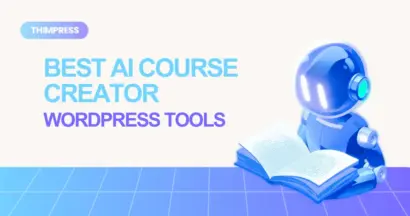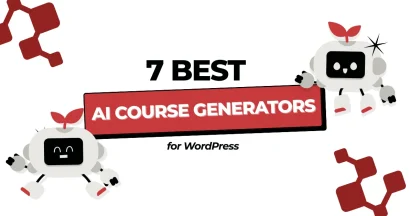Are you facing a blank page and struggling to start your essay, article, or report? You are not alone. Many students, bloggers, and professionals find writing to be one of the most time-consuming tasks. Luckily, artificial intelligence(AI) now offers tools that can help you overcome writer’s block, create outlines, and even draft complete essays. These platforms are often called AI essay writer tools or AI essay generators.
But with so many choices available, which is the best AI essay writer for your needs? Some tools focus on academic writing, others on marketing or creative content, and some try to balance everything.
In this guide, we compare the most popular options—both free and paid—to help you make the right decision.
We will look at features, pros, cons, ideal users, and pricing for each AI essay writer, which also connect to broader generative AI tools that power different content workflows.. You will also find a comparison table, answers to common questions, and some advice on how to use AI ethically and responsibly.
Eduma – Education WordPress Theme
We provide an amazing WordPress theme with fast and responsive designs. Let’s find out!
What Is an AI Essay Writer?
An AI essay writer is a software application powered by large language models (LLMs). These tools generate human-like text when you provide prompts or instructions. They can:
- Suggest essay ideas and outlines
- Draft introductions, body paragraphs, and conclusions
- Rephrase or expand existing content
- Assist with grammar, style, and tone adjustments
While AI can speed up the writing process, it is important to remember that these tools are assistants — see how broader AI content writer platforms approach drafting and editing. They are not replacements for your own knowledge, creativity, or critical thinking. Especially in academic settings, AI should be used responsibly for brainstorming and drafting—not as a shortcut to avoid original work.
6+ Top AI Essay Writer Tools Compared: Features, Pros, Cons & Ideal Users
Below, we review six leading tools that can generate essays and long-form content. Each review includes pros, cons, and best use cases so you can decide which one fits your needs.
Jasper AI (Formerly Jarvis)
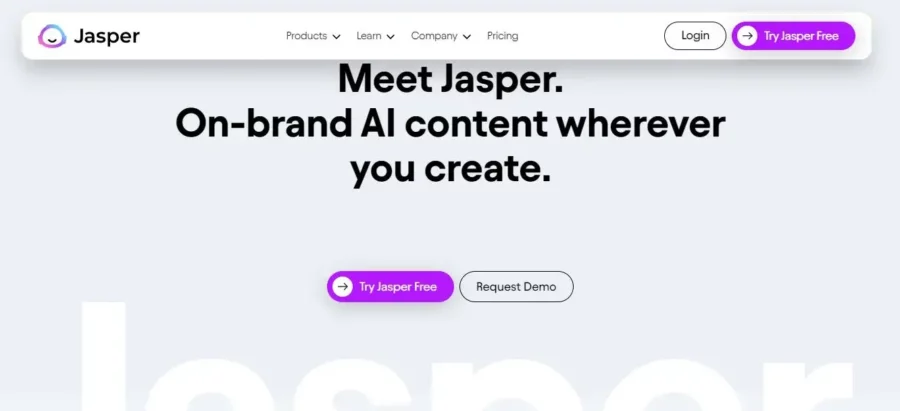
Jasper AI positions itself as a premium AI writing assistant, renowned for generating high-quality, coherent, and often creative content across various formats. It leverages advanced AI models and offers an extensive suite of templates and features designed primarily for marketers and content professionals, but adaptable for essay tasks.
Pros:
- High-Quality Long-Form Content: Excels at producing well-structured and nuanced drafts for essays and articles, often requiring less editing than competitors.
- Brand Voice & Customization: Features like Brand Voice allow Jasper to learn and mimic specific writing styles and tones for consistent output. Offers various templates and modes (like Focus or SEO Mode).
- Helpful Integrations: Often includes plagiarism checking, grammar support, and SEO optimization features, similar to those found in AI for SEO tools.
Cons:
- Higher Cost: Jasper is one of the more expensive options, making it a significant investment, especially for students or casual users.
- Learning Curve: The extensive features and options, while powerful, can initially feel overwhelming for new users.
- Limited Free Trial: Typically offers a brief trial period with restricted usage, making thorough evaluation difficult without payment.
Best For: Professional bloggers, marketers, content teams, and businesses needing top-tier, brand-aligned content and who have the budget for a premium tool.
Writesonic
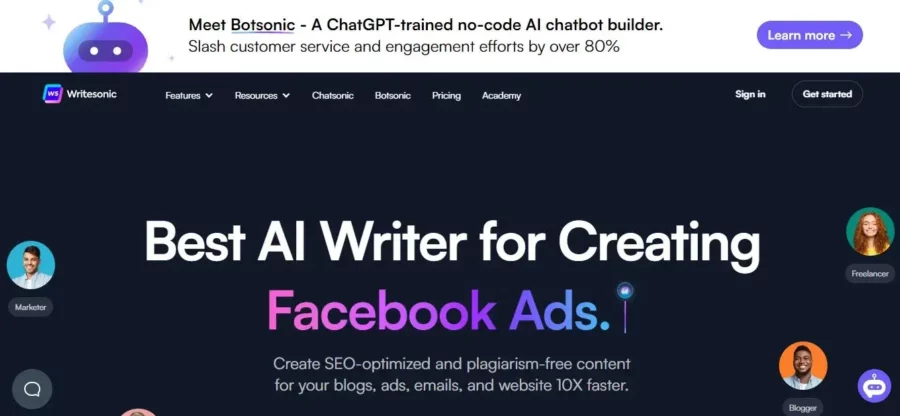
Writesonic is a versatile AI writing platform offering a broad range of tools for different content types — see how it compares with other generative AI tools. Its Sonic Editor feature specifically aims to assist with factual and academic writing by integrating real-time data from Google Search, attempting to bridge the gap between AI generation and factual accuracy.
Pros:
- Research-Augmented Writing: Sonic Editor’s ability to pull current information can be beneficial for research-based essays (though fact-checking remains essential). Offers different AI quality levels (e.g., GPT-3.5, GPT-4) for flexibility.
- Specific Templates & Free Start: Provides templates tailored for articles, essays, and blog posts. Often includes a limited free trial or a usable free plan, making it a good free AI essay writer starting point.
- Versatility: Handles various content formats, from essays and articles to ad copy and social media posts.
Cons:
- Confusing Credit System: Operates on a credit system where different actions and quality levels consume varying amounts, which can be hard to predict and manage.
- Editing Often Required: Despite research features, the output often requires significant editing for flow, coherence, accuracy, and unique voice.
- Cost for High Quality: Using the highest quality models (like GPT-4) consumes credits quickly, potentially increasing costs.
Best For: Students (using features ethically for research aid and outlining), SEO content creators leveraging real-time data, and bloggers looking for a feature-rich tool with a flexible entry point.
Rytr
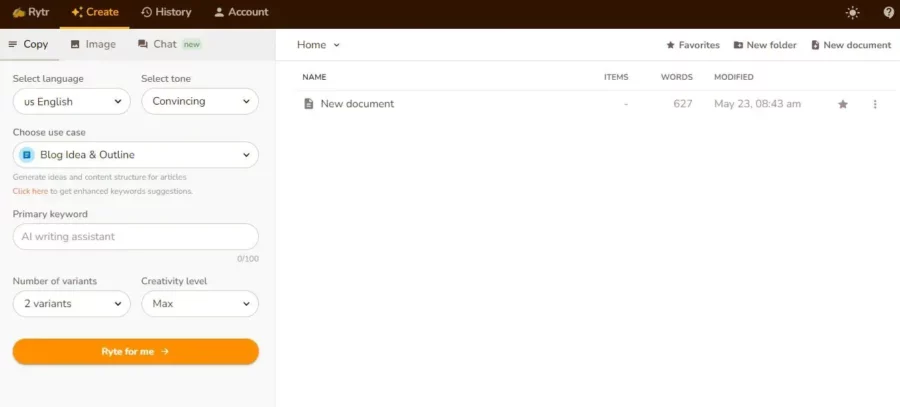
Rytr is celebrated for its simplicity, affordability, and one of the most generous free plans available in the AI writing market. It focuses on providing a straightforward, easy-to-use interface for generating various short-form content types quickly.
Pros:
- Exceptional Ease of Use: Features an incredibly intuitive and clean interface, making it perfect for AI writing beginners.
- Great Value & Free Plan: Offers highly competitive pricing and a substantial free tier — Rytr and other low-cost options are included in our Free AI Content Writer roundup.
- Multi-Language & Tone Support: Supports numerous languages and allows users to select from various tones (e.g., formal, casual, convincing) to tailor the output.
Cons:
- Less Sophisticated Output: The generated text quality, while decent for simple tasks, may lack the depth, nuance, and complexity of premium tools, especially for academic essays.
- Basic Long-Form Editor: While it can generate longer pieces, its editor and features for managing extensive documents are less advanced.
- Free Plan Limitations: The character limit on the free plan can be restrictive for generating full essays or longer articles.
Best For: Beginners, users on a tight budget, generating quick ideas, social media posts, product descriptions, short paragraphs, or anyone needing a solid, easy-to-use free option.
Copy.ai
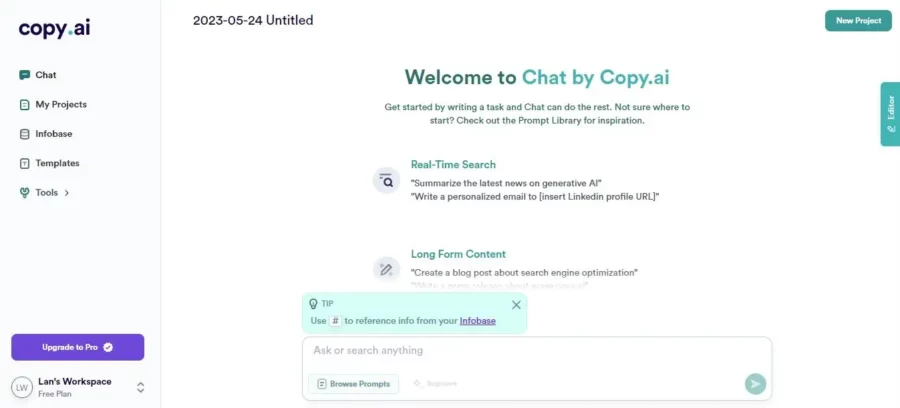
Copy.ai primarily focuses on generating high-converting marketing (conversion rates) and sales copy, but its versatile templates (over 90 typically available) and freestyle tools can certainly be adapted for brainstorming and drafting essay content. It emphasizes ease of use and creative output.
Pros:
- Strong Creativity & Brainstorming: Excellent for generating unique angles, hooks, headlines, and exploring different perspectives on a topic.
- User-Friendly Interface: Features a clean, intuitive layout that makes navigating templates and generating content straightforward.
- Robust Free Plan: Often provides a generous free plan allowing users to generate a significant amount of text monthly, suitable for trying out its features.
Cons:
- Marketing Tone Bias: The output style can sometimes lean marketing-heavy; pair outputs with content-checking tools (see our AI content checker guide) to verify style and originality.
- Less Academic Focus: Lacks specialized features explicitly designed for academic research or citation management.
- Long-Form Consistency: While capable of generating longer text, maintaining coherence and logical flow over extended essays might require more manual intervention.
Best For: Marketers, copywriters, social media managers, generating creative ideas and outlines, users who need a tool for both marketing copy and general writing assistance.
Textero.ai
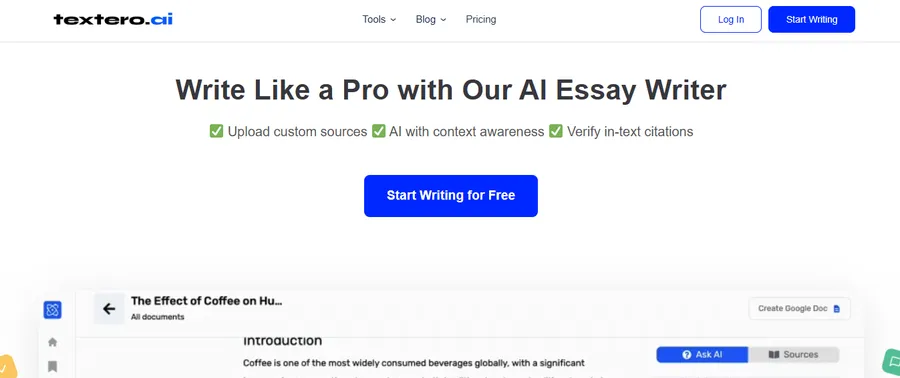
Textero.ai is frequently marketed directly to students and academics, aiming to be a specialized assistant for research papers and essays. It often bundles features tailored to the academic writing process.
Pros:
- Academic Feature Focus: Often includes tools specifically for academic needs, such as finding sources, generating outlines, providing citation assistance (verify accuracy!), and integrated plagiarism checks.
- Student-Friendly Interface: The platform layout and workflow are typically designed with student assignments in mind, aiming for ease of use.
- Plagiarism & AI Detection: Often incorporates tools to check for originality and potentially flag AI-generated content (though detector accuracy varies).
Cons:
- Potentially Less Versatile: May not be as effective for non-academic writing tasks like creative writing or marketing copy compared to broader tools. If you do a lot of email writing as well, check our comparison of AI email assistant platforms to find tools specialized for fast, context-aware emails.
- Feature Reliability: As a potentially more niche tool, the consistency and accuracy of its specialized features (like citation generation) must be carefully verified by the user.
- Output Quality Variation: The underlying AI’s sophistication might vary, potentially requiring editing for complex academic arguments.
Best For: Students seeking an AI tool specifically designed to assist with academic tasks like research discovery, outlining, and drafting (must be used ethically and responsibly, with rigorous fact-checking and source verification).
Article Forge
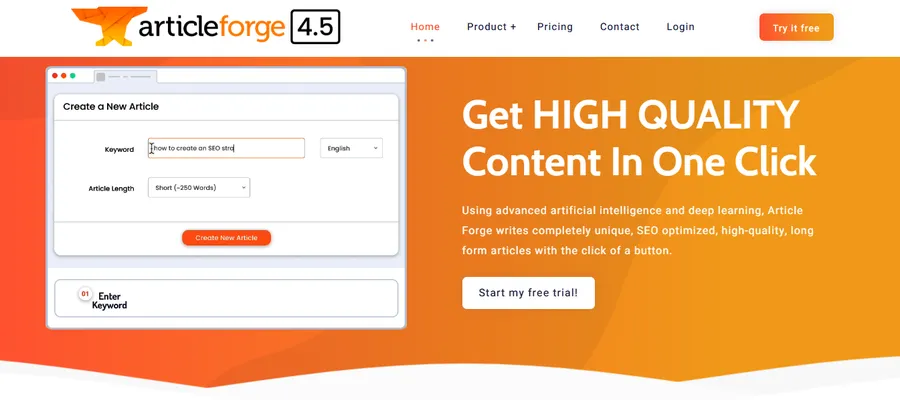
Article Forge takes a unique approach by focusing on fully automated generation of entire long-form articles (often 1,500+ words) from just a keyword input. It heavily emphasizes speed, bulk creation, and SEO integration.
Pros:
- Extreme Speed & Automation: Can generate complete articles in minutes, offering unparalleled speed for content production.
- Bulk Content Generation: Allows bulk article creation — compare that approach with faster article workflows in our post on AI article writer tools.
- Integrations: Often integrates with SEO tools and allows direct posting to WordPress, streamlining publishing workflows.
Cons:
- Highly Variable Quality: The quality of generated articles can be inconsistent and frequently requires substantial editing, fact-checking, and restructuring to meet acceptable standards. Content can be generic or lack depth.
- Limited User Control: Offers less control over the writing process compared to tools where you guide the AI step-by-step.
- Accuracy & Detectability Issues: Prone to factual inaccuracies, and research shows its content is often easily flagged by AI detection tools, despite claims otherwise.
Best For: Primarily suited for SEO specialists needing large volumes of draft content for specific strategies like PBNs (requiring heavy manual review and editing). Users are prioritizing sheer speed and automation over nuanced quality and control.
Quick Comparison Table
| Tool | Best For | Free Plan | Strengths | Weaknesses |
|---|---|---|---|---|
| Jasper AI | Premium quality, businesses | Limited | Long-form quality, integrations | Expensive, complex |
| Writesonic | Research & SEO-focused writing | Yes | Real-time data, versatility | Credit system, editing |
| Rytr | Beginners & budget users | Yes | Easy to use, generous free plan | Basic depth |
| Copy.ai | Creative brainstorming & essays | Yes | Creative ideas, free plan | Persuasive style bias |
| Textero.ai | Academic writing (students) | Limited | Citation support, plagiarism check | Needs verification |
| Article Forge | Bulk & automated long-form content | No | Speed, automation | Generic output, low quality |
Conclusion: Which is the Best AI Essay Writer for You?
As we’ve seen, there is no single definitive answer to which platform qualifies as the absolute best AI essay writer. The ideal choice hinges on your specific needs, budget, and tolerance for editing:
- Best Overall Quality (Budget Permitting): Jasper AI generally leads for sophisticated output and professional features, but comes at a premium price.
- Best Value / Free Option: Rytr offers remarkable value with its affordable plans and a highly usable free AI essay writer tier, perfect for beginners and lighter use.
- Best for Students (Use Ethically): Textero.ai (with its academic focus) or Writesonic (with its Sonic Editor and research capabilities) are strong contenders, but ethical use and fact-checking are non-negotiable.
- Best for Versatility & Marketing: Writesonic and Copy.ai offer a good balance of features for various content types, including strong marketing angles.
- Best for Speed & Automation (Use Cautiously): Article Forge excels at generating bulk content rapidly, but demands significant post-editing and quality control.
Ultimately, AI essay writers are powerful tools. They can augment your writing process, help you overcome hurdles, and save time. But they require careful guidance, critical evaluation, and ethical usage. Explore the free trials, weigh the pros and cons, and choose the assistant that best empowers your writing journey.
FAQs for the Best AI Essay Writer:
Q1: What exactly is an AI essay writer?
A: An AI essay writer is software powered by artificial intelligence, typically using large language models (LLMs). It generates human-like text for essays or articles based on prompts and instructions provided by the user. These tools are designed to assist with various stages of the writing process, including brainstorming ideas, creating outlines, and drafting content.
Q2: Are there any truly free AI essay writers?
A: Yes, several AI essay writing tools offer free plans or extended free trials. Options like Rytr are well-known for having a generous free tier, and platforms such as Writesonic and Copy.ai often provide free plans as well. However, these free versions usually come with limitations, such as a monthly cap on word or character count, restricted access to advanced features, or fewer available templates. It's essential to check the specific limitations of any free AI essay writer plan before relying on it.
Q3: Can teachers or detectors identify AI-written essays?
A: There are AI detection tools available, and they are constantly evolving, but their accuracy can be inconsistent. They sometimes flag human writing as AI-generated and vice-versa. While some AI writing might exhibit patterns detectable by these tools, relying solely on avoiding detection is risky. More importantly, submitting AI-generated work as your own often violates academic integrity policies, regardless of whether it's detected. Standard plagiarism checkers are also crucial for identifying copied text, whether AI-generated or not.
Q4: Is using an AI essay writer considered plagiarism?
A: It certainly can be. Directly submitting text generated by an AI tool as your own original work constitutes plagiarism. Furthermore, because AI models learn from vast datasets, they can sometimes produce text that is unintentionally very similar to existing sources, leading to plagiarism if not carefully checked and cited. Using AI for brainstorming, outlining, or getting initial ideas is generally acceptable, but representing AI-generated text as your own without significant rewriting, adding your own thoughts, and proper attribution is unethical and often violates academic rules. Always consult your institution's specific academic integrity policy.
Q5: Which AI essay writer is the best?
A: As highlighted throughout this post, the best AI essay writer truly depends on your individual needs, priorities, and budget. There is no single definitive winner. Jasper often leads for premium quality, Rytr excels in value and free access, Textero.ai and Writesonic offer features potentially useful for students (when used ethically), Copy.ai is strong for creative and marketing content, and Article Forge prioritizes speed (with major quality caveats). Evaluate tools based on their specific features, ease of use, output quality, pricing, and how well they align with your intended use case.
Read more:
7+ Best ChatGPT Alternative Tools (Free Included)
8+ Best AI Social Media Post Generators to Boost Your Content Strategy
Top 6 AI Code Detector Tools to Verify Your Code
Contact US | ThimPress:
Website: https://thimpress.com/
Fanpage: https://www.facebook.com/ThimPress
YouTube: https://www.youtube.com/c/ThimPressDesign
Twitter (X): https://x.com/thimpress_com

